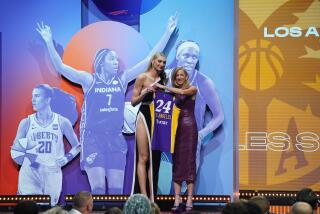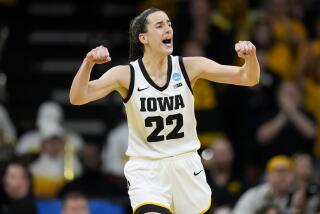TAKING A FLIER
- Share via
In the last few years Michael Richie worked as a toolmaker for Chrysler, a production manager for a biotech firm and as a machinist at Caterpillar. He was laid off from all three jobs and now wants to give professional basketball a try -- at age 34.
Richie, a 5-foot-10 guard who played for Indiana Tech, planned to play in Britain after college but a torn knee ligament derailed his plans. He’s now a pastor at a church in Indiana but couldn’t resist pursuing his hoop dreams one more time.
Welcome to the third installment of the NBA Development League’s pre-draft camp tryouts, where 200 prospects competed last weekend in Hawthorne for a chance to be selected in the November draft -- although only a dozen are likely to end up with contracts.
“It means a tremendous amount to me,” Richie said. “They’ve been gracious enough to give me a shot. You think no one would give me a shot at my age, but the D-League did.”
The pay is modest in the D-League; the average salary is $20,000. But players would happily accept it because there’s a chance of being called up by an NBA team. Last season more than 80 former D-League players spent time on NBA rosters.
“Of course you’re not going to get paid that much in the D-League, but you’re sacrificing for the ultimate goal,” said Tracy Murray, who played 12 years in the NBA and was scouting at the D-League tryout. “If your dream is to play in the NBA, this is where you want to be.”
So last weekend players filed onto a charter bus about 7 a.m., bound for a gym in a converted airplane hangar behind the Hawthorne Airport. For most players, it was their only chance to perform in front of scouts, general managers and coaches representing all 16 D-League teams.
Randy Livingston, a former Houston Rockets guard who is an associate head coach with the D-League’s Idaho Stampede, spent the weekend coaching “Team 11.” He generally offered the same advice to each prospect: Embrace being a role player. “Instead of worrying about scoring 100 points a game and looking pretty, do the dirty work: Rebound and hustle,” Livingston said.
To draw extra attention, Jerome Ireland, a 5-foot-8 guard from Porterville College, wore bright yellow Pro-Keds with matching socks. “A couple coaches came around and said it’s a good way to get some notoriety,” said Ireland, 24. “I feel like I’ve already accomplished some of that. And that’s what we’re all here for, to get someone to check us out.”
But Ireland’s flashy look did not carry over to his play. In his first game he had no points, two rebounds and a steal.
Each player was guaranteed to play at least 15 minutes a game and each played in four games over the weekend.
“They need to come out here and let their game do the talking,” Murray said. “Once you’ve proven yourself as a player, then you could break ground as far as what shoes to wear. But if you’re just a number, no one pays attention to that.”
The brevity of the tryouts left little room for error.
Garen Clunis, a 6-4 guard who played for a college in Jamaica, rolled his ankle while battling for a rebound and gingerly walked to test it. He grimaced as he shot a pair of free throws but played the remainder of the game.
Afterward, he received treatment on his swollen ankle and played in the next game.
“Pain or no pain, this is a chance of a lifetime and I’m going for it,” said Clunis, 29. “They’d have to take my leg off because I’m not going to stop.”
Sometimes a player’s age influences how much attention he gets from scouts.
“Basically there’s a window that you have to get in the NBA,” Murray said, noting that age is typically between 20 and 26. “If you’ve been looked over, and you might be 27, 28, and they feel like they could get a few good years out of you, they’ll roll the dice.”
The youngest player at the tryout was Nikolas Rhodes, 18, who said he was from Reseda Cleveland High and returned to the U.S. after a brief stint at a university in England.
Still, the long odds did not discourage Rhodes, Ireland, Richie and the others, who each submitted an application and paid $550 -- all for the chance of a lifetime.
“There are other players here who this is their shot, you know,” D-League Commissioner Dan Reed said. “Who are we to dissuade someone from taking a shot and making the big time?”
--
More to Read
Go beyond the scoreboard
Get the latest on L.A.'s teams in the daily Sports Report newsletter.
You may occasionally receive promotional content from the Los Angeles Times.










